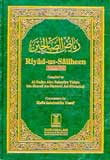Riyad Us-Saliheen (Gardens of the Righteous)

Chapter 206
Merit of the (Optional) Duha (Forenoon) Prayer
1139. Abu Hurairah (May Allah be pleased with him) reported: My Khalil (the Messenger of Allah (PBUH)) directed me to fast three days of each month, and to observe two Rak`ah Duha (optional prayer) at forenoon, and to perform the Witr prayer before going to bed.
[Al-Bukhari and Muslim].
Commentary: "Three days'' can be any three days of a month, but it is better if one opts 13th, 14th and 15th of every lunar month because the Prophet (PBUH) used to observe fasting on these days.
This Hadith also highlights the importance of Duha and Witr prayer, and proves the merit of giving counsel persuasion and inducement for virtuous deeds.
1140. Abu Dharr (May Allah be pleased with him)reported: The Prophet (PBUH) said, "In the morning, charity is due on every joint bone of the body of everyone of you. Every utterance of Allah's Glorification (i.e., saying Subhan Allah) is an act of charity, and every utterance of His Praise (i.e., saying Al-hamdu lillah) is an act of charity and every utterance of declaration of His Greatness (i.e., saying La ilaha illAllah) is an act of charity; and enjoining M`aruf (good) is an act of charity, and forbidding Munkar (evil) is an act of charity, and two Rak`ah Duha prayers which one performs in the forenoon is equal to all this (in reward).''
[Muslim].
Commentary: "Charity is due from every joint bone" means that when a person gets up in the morning, it is obligatory for him to thank Allah for having every joint of his intact. Therefore, one must praise and glorify Allah. Since a single invocation of the words mentioned in this Hadith is equivalent to one Sadaqah, one must say these words for 360 times - a number which equals the number of joints in man's body. Moreover, to enjoin someone to do what is good and dissuade somebody from vice constitutes Sadaqah. However, if one performs two Rak`ah of Duha prayer, it will serve for Sadaqah for all the joints of the body. Thus, this Hadith highlights the merits and importance of Duha prayer. We also learn from this Hadith that Sadaqah is not restricted to spending money alone but also has a vast meaning and covers all forms of virtues mentioned here.
1141. `Aishah (May Allah be pleased with her) reported: The Messenger of Allah (PBUH) used to perform four Rak`ah of Duha prayer (at the forenoon) and would add to them whatever Allah wished.
[Muslim].
Commentary: We learn from this Hadith that the Prophet (PBUH) used to perform usually four Rak`ah in Duha prayers but sometimes he also performed more. In some of the Ahadith, their number varies from two to eight. One is therefore free to perform two, four or eight Rak`ah according to his convenience.
1142. Umm Hani, daughter of Abu Talib (May Allah be pleased with her) reported: I went to the Messenger of Allah (PBUH) on the day of the conquest of Makkah. He was taking a bath at that time. When he finished the bath, he performed eight Rak`ah (of optional) prayers. This was during the Duha (forenoon).
[Al-Bukhari and Muslim].
Commentary: This Hadith holds that Duha prayer consists of eight Rak`ah. Another Hadith elaborates that the Prophet (PBUH) performed these Rak`ah in four couplets. What is the time of Duha prayer? Is Duha prayer and Ishraq prayer one and the same? There is a difference of opinion on these issues. Some people think that Duha and Ishraq are two different names for one and the same prayer, and this is performed soon after sunrise. While others think that the earliest time of Duha prayer is soon after sunrise and the last is a little before the sun begins to decline. The one performed in the early hours is called Ishraq prayer, while the one performed in the late hours is called Duha prayer. Some people say that the two Rak`ah performed at the time when the sun is at a height of a lance in the sky is Ishraq, and the one, comprising four Rak`ah, performed when the sun covers one fourth of the sky is Duha. (For more details, see Miratul-Mafatih, a commentary of Mishkat Al-Masabih, Chapter Duha prayer). The majority of Muslim scholars consider this prayer as Mustahabb (desirable).
